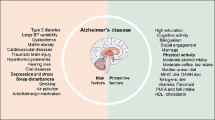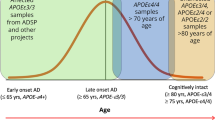Abstract
Background
Alzheimer’s disease (AD) is a progressive neurodegenerative illness that leads to impairment of cognitive functions and memory loss. Even though there is a plethora of research reporting the abnormal regulation of VEGF expression in AD pathogenesis, whether the CSF and serum VEGF are increased in AD is an open question yet. In this study, the association of CSF and serum VEGF concentrations with the risk of Alzheimer’s disease was investigated using systematic review and meta-analysis.
Methods
A systematic literature search was carried out using online specialized biomedical databases of Web of Science, Pubmed, Scopus, Embase, and Google Scholar until Feb 2023 without restriction to the beginning time. The meta-analysis was performed using the random-effects model and only case-control publications describing VEGF concentrations in Alzheimer’s patients were considered for calculating the pooled effect size.
Results
In the systematic literature search, 6 and 13 studies met the inclusion criteria to evaluate CSF and serum VEGF concentrations of Alzheimer’s patients, respectively. This meta-analysis retrieved a total number of 2380 Alzheimer’s patients and 5368 healthy controls. Under the random-effects model in the meta-analysis, the pooled SMD for CSF and serum VEGF concentrations of Alzheimer’s patients were −0.13 (95%CI,−0.42–0.16) and 0.23 (95%CI,−0.27–0.73), respectively. Results of meta-regression analysis showed that the quality scores of papers and female sex ratios of participants did not affect the associations of VEGF concentrations with the risk of Alzheimer’s disease. However, the age average of patients significantly affects the associations of CSF VEGF concentrations with the risk of Alzheimer’s disease (P=0.051). There was a statistically significant subgroup effect for the disease severity of Alzheimer’s patients which modifies the associations of serum VEGF concentrations with the risk of Alzheimer’s disease (P<0.01) and subgroup analysis shows that study location modifies the associations of CSF and serum VEGF concentrations with the risk of Alzheimer’s disease (P<0.01).
Conclusion
The results show that the serum VEGF concentrations increased for Alzheimer’s patients in accordance with the increased expression of VEGF and the VEGF levels of Alzheimer’s patients decreased by increasing their disease severities. Therefore, in addition to detecting AD in the earliest stages of the disease, serum VEGF could be a promising biomarker to follow up on the disease and evaluate the clinical course of the disease.






Similar content being viewed by others
Availability of data and material: All data generated or analyzed during this study are included in the article.
References
Chiappelli M, Borroni B, Archetti S, et al. VEGF gene and phenotype relation with Alzheimer’s disease and mild cognitive impairment. Rejuvenation. 2006;9(4):485–93. https://doi.org/10.1089/rej.2006.9.485
Yu S, Liu YP, Liu YH, et al. Diagnostic utility of VEGF and soluble CD40L levels in serum of Alzheimer’s patients. Clin Chim Acta. 2016;453:154–9. https://doi.org/10.1016/j.cca.2015.12.018
Huang L, Jia J, Liu R. Decreased serum levels of the angiogenic factors VEGF and TGF-β1 in Alzheimer’s disease and amnestic mild cognitive impairment. Neurosci Lett. 2013;550:60–3. https://doi.org/10.1016/j.neulet.2013.06.031
Tarkowski E, Issa R, Sjögren M, et al. Increased intrathecal levels of the angiogenic factors VEGF and TGF-β in Alzheimer’s disease and vascular dementia. Neurobiol Aging. 2002;23(2):237–43. https://doi.org/10.1016/S0197-4580(01)00285-8
Shen XN, Lu Y, Tan CTY, et al. Identification of inflammatory and vascular markers associated with mild cognitive impairment. Aging. 2019;11(8):2403–19. https://doi.org/10.18632/aging.101924
Erhardt EB, Adair JC, Knoefel JE, et al. Inflammatory Biomarkers Aid in Diagnosis of Dementia. Front. Aging Neurosci. 2021;13:1–11. https://doi.org/10.3389/fnagi.2021.717344
Guo L-H, Alexopoulos P, Perneczky R. Heart-type fatty acid binding protein and vascular endothelial growth factor: cerebrospinal fluid biomarker candidates for Alzheimer’s disease. Eur Arch Psychiatry Clin Neurosci. 2013;263(7):553–60. https://doi.org/10.1007/s00406-013-0405-4
Kim YN, Kim DH. Decreased serum angiogenin level in Alzheimer’s disease. Prog Neuropsychopharmacol Biol Psychiatry. 2012;38(2):116–20. https://doi.org/10.1016/j.pnpbp.2012.02.010
Vagnucci AH, Li WW. Alzheimer’s disease and angiogenesis. Lancet. 2003;361(9357):605–8. https://doi.org/10.1016/S0140-6736(03)12521-4
Callahan CM, Apostolova LG, Gao S, et al. Novel Markers of Angiogenesis in the Setting of Cognitive Impairment and Dementia. J Alzheimer’s Dis. 2020;75(3):959–69. https://doi.org/10.3233/JAD-191293
Cho SJ, Park MH, Han C, Yoon K, Koh YH. VEGFR2 alteration in Alzheimer’s disease. Sci Rep. 2017;7(1):1–11. https://doi.org/10.1038/s41598-017-18042-1
Mateo I, Llorca J, Infante J, et al. Low serum VEGF levels are associated with Alzheimer’s disease. Acta Neurol Scand. 2007;116(1):56–8. https://doi.org/10.1111/j.1600-0404.2006.00775.x
Silva T, Stein AM, Coelho FGM, Rueda AV, Camarini R, Galduróz RF. Circulating levels of vascular endothelial growth factor in patients with Alzheimer’s disease: A case-control study. Behav Brain Res. 2023;437:1–6. https://doi.org/10.1016/j.bbr.2022.114126
Alvarez XA, Alvarez I, Aleixandre M, et al. Severity-Related Increase and Cognitive Correlates of Serum VEGF Levels in Alzheimer’s Disease ApoE4 Carriers. J Alzheimer’s Dis. 2018;63(3):1003–13. https://doi.org/10.3233/jad-160477
Del Bo R, Scarlato M, Ghezzi S, et al. Vascular endothelial growth factor gene variability is associated with increased risk for AD. Ann Neurol. 2005;57(3):373–80. https://doi.org/10.1002/ana.20390
Liberati A, Altman DG, Tetzlaff J, et al. The PRISMA statement for reporting systematic reviews and meta-analyses of studies that evaluate health care interventions: explanation and elaboration. Ann Intern Med. 2009;151(4):65–94. https://doi.org/10.1371/journal.pmed.1000100
Chen H, He J. Correlation of plasma adiponectin and aβ deposition-related indexes with VEGF, FOL, and VitB12 in patients with Alzheimer’s disease. Acta Medica Mediterr. 2021;37(2):891–5. https://doi.org/10.19193/0393-6384_2021_2_135
Mateo I, Llorca J, Infante J, et al. Low serum VEGF levels are associated with Alzheimer’s disease. Acta Neurol Scand. 2007;116(1):56–8. https://doi.org/10.1111/j.1600-0404.2006.00775.x
Trares K, Bhardwaj M, Perna L, et al. Association of the inflammation-related proteome with dementia development at older age: results from a large, prospective, population-based cohort study. Alzheimers Res Ther. 2022;14(1):1–17. https://doi.org/10.1186/s13195-022-01063-y
Chakraborty A, Chatterjee M, Twaalfhoven H, et al. Vascular Endothelial Growth Factor remains unchanged in cerebrospinal fluid of patients with Alzheimer’s disease and vascular dementia. Alzheimers Res Ther. 2018;10(1):1–7. https://doi.org/10.1186/s13195-018-0385-8
Craig-Schapiro R, Kuhn M, Xiong C, et al. Multiplexed immunoassay panel identifies novel CSF biomarkers for Alzheimer’s disease diagnosis and prognosis. PloS one. 2011;6(4):1–15. https://doi.org/10.1371/journal.pone.0018850
Hohman TJ, Bell SP, Jefferson AL. The role of vascular endothelial growth factor in neurodegeneration and cognitive decline: exploring interactions with biomarkers of Alzheimer disease. JAMA Neurol. 2015;72(5):520–9. https://doi.org/10.1001/jamaneurol.2014.4761
Blasko I, Lederer W, Oberbauer H, et al. Measurement of thirteen biological markers in CSF of patients with Alzheimer’s disease and other dementias. Dement Geriatr Cogn Disord. 2006;21(1):9–15. https://doi.org/10.1159/000089137
Acknowledgements
The authors would like to thank the research affair of Ilam University of Medical Sciences.
Funding
Funding: This study was funded by Ilam University of Medical Sciences.
Author information
Authors and Affiliations
Contributions
Authors’ contributions: Seyed Salman Zakariaee: Content planning, Literature Search and Review, Data collection, Manuscript writing and editing, and Meta-Analysis. Negar Naderi: Literature Search and Review, Data collection, and Manuscript editing. Esfandyar Azizi: Project development, Literature Search and Review, Manuscript writing and editing.
Corresponding author
Ethics declarations
Ethics approval and consent to participate: The study was approved by the local Medical Ethical Committee.
Competing interests: The authors declare that they have no competing interests.
Additional information
Consent for publication: Not applicable.
How to cite this article: S.S. Zakariaee, N. Naderi, E. Azizi, et al. Association of Vascular Endothelial Growth Factor Levels with Risk of Alzheimer’s Disease: A Systematic Review and Meta-Analysis. J Prev Alz Dis 2024; https://doi.org/10.14283/jpad.2024.18
Rights and permissions
About this article
Cite this article
Zakariaee, S.S., Naderi, N. & Azizi, E. Association of Vascular Endothelial Growth Factor Levels with Risk of Alzheimer’s Disease: A Systematic Review and Meta-Analysis. J Prev Alzheimers Dis 11, 721–729 (2024). https://doi.org/10.14283/jpad.2024.18
Received:
Accepted:
Published:
Issue Date:
DOI: https://doi.org/10.14283/jpad.2024.18




